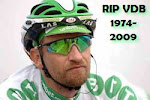I'm not surprised that he articulates a feeling of relief at being caught, almost a liberation. He says that once having begun to dope, the only way out was with a positive test:
NZZ: Jetzt, da Sie überführt wurden und Sie gestanden haben, sind Sie erleichtert?
Now that you have been convicted and have been you, you will be relieved?
TF: Ja. So doof das klingt: Wenn man mal mit Doping begonnen hat, ist der einzige Ausweg die positive Probe.
Yes. So stupid that sounds, if one has even begun with doping, is the only way the positive sample. [That is, once you've started doping, the only way you stop is by testing positive.]
I was recently asked if I would have continued doping 1) had I not been caught and 2) had Whistle gone ahead and delivered me the lucrative contract they promised for 2007 when the team would become Cinelli-Endeka-OPD.
My response:
"I don’t think it would have mattered if I’d gotten a huge contract or not, b/c my subconscious had already done me in – I believe that I subconsciously wanted to get caught b/c it was the only way I would stop doping. I consciously don’t think that I could have brought myself to the point of stopping, b/c it facilitated my continued , participation in elite cycling in Europe. But I didn’t want to continue and remember a moment of self-reflection when I recoiled at the fact that I had become more adept at injecting myself w/ an IV than most nurses."
David Millar has consistently expressed a similar sentiment, though at first I thought he was just being self-serving. Now, however, I understand that doping exerts a powerful hold over its practitioners, and even the ones who would seem to have a strong sense of character and an intellectual understanding of right and wrong can find it inescapable.
In 2004, Millar told the Guardian UK, "You dope because you are a prisoner of yourself, of glory, of money. I was a prisoner of the person that I had become."
And then earlier this year, during an interview with Cycling Weekly, Millar described his two-year ban and forced hiatus from the sport as something that he no longer saw as destructive:
"That's a positive of getting caught, and getting out of that spiral I was in. It allowed me to reboot my life. There's no way I'd be here now, if none of that stuff had happened, and if I'd continued the linear development I was on as a young athlete, I wouldn't have found such happiness. You end up in this eternal, success-driven, materialistic world. I escaped that by losing everything and having to start again."
The theme of being trapped, of being a prisoner to doping is constant. And what can or should you do with riders like this after they've gone positive? Do you try to flip them and prey on their own self-loathing in hopes of turning them publicly against doping and the riders they know who remain undiscovered, or do you just banish them without study, intending to make a harsh example to others of what happens when an athlete is caught?
My own situation not withstanding, I'm wondering if doping is not something that could also be studied as more of addiction-related condition, rather than just a question of greed or criminal behavior. When someone wants to stop (as Frei implies he did) but can't, and even says that only testing positive would halt the individual's cheating...maybe appeals limited to the ethical or moralistic aspects of a rider's personality are incomplete and should be augmented not just by threats of prosecution, but also by approaches one might use with an addict? Before anyone makes the mistake of thinking that I'm trying to excuse such behavior, I'm not. But if there is a disease component to someone's anti-social behavior, is that a valid point of inquiry when searching for a solution?
This WADA report on the attitudes and experiences of medical doctors towards doping in the Balkan region is an interesting starting-point for further study.








I wonder how many cyclists who dope are also recreational drug users? Two I think of right away are Tom Boonen and Aitor Gonazalez. Oh, and Marco Pantani. Jose Maria Jimenez. VDB. Who else? Many, probably. I'm actually surprised that more don't make the news for drunk-driving or domestic violence.
ReplyDeletePapp, do you ever do blow? Did your teammates?
ReplyDelete